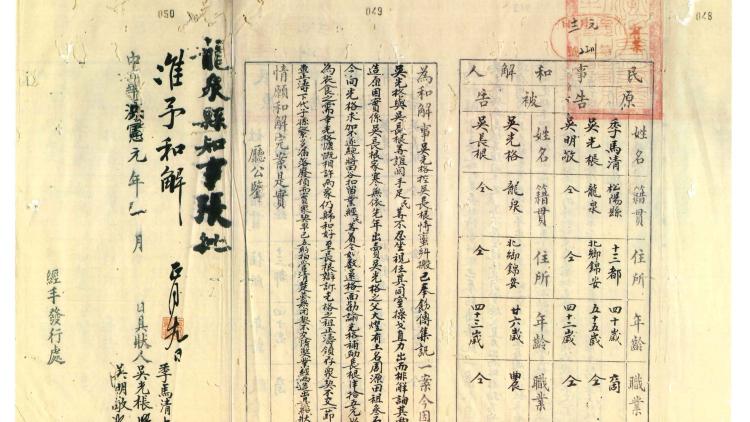
Mind what you wear in public: China’s controversial proposed amendments to police-administered penalties

Key information
- Date
- Time
-
6:00 pm to 7:30 pm
- Venue
- Russell Square: College Buildings
- Room
- G3
About this event
In September 2023, a draft of China’s revised Law on Penalties for Administration of Public Security (PAPS) was posted online for public consultation. However, several proposed amendments caused a huge public outcry online and the consultation drew an unprecedented number of submissions.
The most controversial proposals include the prohibition of a) the wearing of clothing or symbols in public places that would harm the spirit of the Chinese nation or would hurt the feelings of the Chinese nation, b) making and spreading of any item or speech to the same effect, and c) any act of negating the deeds and spirit of national heroes and martyrs. A fine of 5,000 yuan and a detention period of 15 days could be incurred for any violation.
PAPS, which can be traced to the early 1900s, has always been controversial. The legislation authorizes and regulates the all-in-one police powers of investigation, conviction, and sentencing of people committing alleged acts that are not to be charged under the Penal Code but are considered as disrupting public order, endangering public safety, or infringing upon the rights of other persons in neighbourhoods and localities. Detention without trial administered by the police can be up to 20 days.
The law is now undergoing a major amendment since the enactment of its modern version in 2005. It is far from certain how the Chinese authorities will tackle the controversies that have arisen from the newly proposed changes and the longstanding problems associated with PAPS. This talk will examine the controversial draft provisions, the possible reasons behind them, the origin of PAPS as well as arguments on how to reform the legislation.
About the speaker
Dr Mei Ning Yan is a visiting scholar at the School of Law, Queen’s University of Belfast. She has also been a visiting scholar at the Philip K. H. Wong Centre for Chinese Law, at The University of Hong Kong since 2016. Dr. Yan specializes in media law and has written on China’s defamation law, privacy law, and media regulation.
She has taught at the Hong Kong Baptist University, Shantou University, and The University of Hong Kong. She worked as a journalist in the 1980s and 1990s covering Hong Kong and Greater China.
Discussants
Dr Ewan Smith is Associate Professor of Public Law at University College London. He has worked on the law and politics of China for over fifteen years; as a lawyer, a diplomat, and a teacher. He holds Bachelor’s and Master’s degrees in comparative law, and a Doctorate in Chinese constitutional law, from Oxford and Harvard universities, and has been admitted to practice in New York for twenty years.
He has previously held positions at Peking, Renmin and Tsinghua universities in China, at the National University of Singapore, and at the US-Asia Law Institute at New York University. From 2005-2015, he worked for the UK Foreign Office, latterly as First Secretary Political in the British Embassy Beijing. Ewan's research on rule of law in China has been published in journals including the China Quarterly, the China Journal and the Asian Journal of Comparative Law.
Professor Michael Palmer is Emeritus Professor of Law at the University of London, and a Professorial Research Associate at the SOAS China Institute, as well as Senior Research Fellow at the Institute of Advanced Legal Studies (IALS), and at the Asia-Pacific Studies Institute, Chinese University of Hong Kong. He is also Cheng Yu Tung Visiting Professor of Law at the Faculty of Law, Hong Kong University. He has twice served as Chair of the former Centre for Chinese Studies at SOAS, and for many years served as academic convenor of the Practical Training Scheme for Chinese Lawyers and the EU-China Legal and Judicial Cooperation Programme. Between 2010 and 2016 he was Professor of Law, Dean, & Associate Dean at STU Law School, in Shantou, China.
His many publications are mainly in the field of comparative law, especially Chinese Law, and cover a wide range of areas including legal history, family law reform, human rights, environmental welfare, civil justice and dispute resolution, consumer protection and criminal law. He is joint editor of the Journal of Comparative Law, and Editor of Amicus Curiae (IALS). For 6 years he served as a member of the Humanities and Social Sciences Panel, Hong Kong Research Grants Council.
Chair: Dr Grace (Yu) Mou, Senior Lecturer in Criminal Justice, SOAS School of Law
Registration
This event is open to the public and free to attend, however registration is required.
Please note that this seminar is taking place on campus and will not be recorded or live-streamed.
Organiser
Contact
- Email: sci@soas.ac.uk
Photo credit: Gigi on Unsplash


